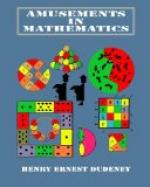104.—CATCHING THE THIEF.
“Now, constable,” said the defendant’s counsel in cross-examination,” you say that the prisoner was exactly twenty-seven steps ahead of you when you started to run after him?”
“Yes, sir.”
“And you swear that he takes eight steps to your five?”
“That is so.”
“Then I ask you, constable, as an intelligent man, to explain how you ever caught him, if that is the case?”
“Well, you see, I have got a longer stride. In fact, two of my steps are equal in length to five of the prisoner’s. If you work it out, you will find that the number of steps I required would bring me exactly to the spot where I captured him.”
Here the foreman of the jury asked for a few minutes to figure out the number of steps the constable must have taken. Can you also say how many steps the officer needed to catch the thief?
105.—THE PARISH COUNCIL ELECTION.
Here is an easy problem for the novice. At the last election of the parish council of Tittlebury-in-the-Marsh there were twenty-three candidates for nine seats. Each voter was qualified to vote for nine of these candidates or for any less number. One of the electors wants to know in just how many different ways it was possible for him to vote.
106.—THE MUDDLETOWN ELECTION.
At the last Parliamentary election at Muddletown 5,473 votes were polled. The Liberal was elected by a majority of 18 over the Conservative, by 146 over the Independent, and by 575 over the Socialist. Can you give a simple rule for figuring out how many votes were polled for each candidate?
107.—THE SUFFRAGISTS’ MEETING.
At a recent secret meeting of Suffragists a serious difference of opinion arose. This led to a split, and a certain number left the meeting. “I had half a mind to go myself,” said the chair-woman, “and if I had done so, two-thirds of us would have retired.” “True,” said another member; “but if I had persuaded my friends Mrs. Wild and Christine Armstrong to remain we should only have lost half our number.” Can you tell how many were present at the meeting at the start?
108.—THE LEAP-YEAR LADIES.
Last leap-year ladies lost no time in exercising the privilege of making proposals of marriage. If the figures that reached me from an occult source are correct, the following represents the state of affairs in this country.
A number of women proposed once each, of whom one-eighth were widows. In consequence, a number of men were to be married of whom one-eleventh were widowers. Of the proposals made to widowers, one-fifth were declined. All the widows were accepted. Thirty-five forty-fourths of the widows married bachelors. One thousand two hundred and twenty-one spinsters were declined by bachelors. The number of spinsters accepted by bachelors was seven times the number of widows accepted by bachelors. Those are all the particulars that I was able to obtain. Now, how many women proposed?




